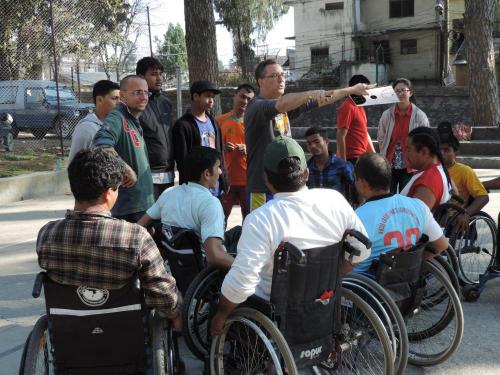
During the past week I was involved with the Nepali NGO ENGAGE, working on disability sports issues, in providing leadership training through the philosophies of a number of American basketball players/coaches. During his life, John Wooden developed a "Pyramid of Success" based on a series of building blocks and lessons in leadership culled from his years of coaching the UCLA Bruins to a remarkable 10 college titles in 12 years, winning seven in a row. Phil Jackson played basketball and won a championship with the New York Knicks, but is more renowned for coaching Michael Jordan of the Chicago Bulls and Kobe Bryant of the Los Angeles Lakers to a total of 11 titles. Bill Bradley was a Rhodes Scholar who attended Princeton, played with Jackson on the Knicks, became a US Senator and ran for president. Bradley has incorporated many lessons into his life from what he learned through basketball in a book titled, Values of the Game.
The training was provided to a variety of persons who have a connection with wheelchair basketball, whether as coaches or players. The idea being to expand what many consider to be only a game, a method for exercising one's body, to include a number of life lessons from being engaged in sports. As I've experienced throughout the years the lessons learned from a team sport can have a profound impact on one's life, including work, when taken to heart and incorporated into a daily regimen.
In reviewing corporate and other sectors team sport lessons are very relevant. For example in the Pyramid of Success, building blocks include industriousness, i.e. there is no way around hard work; loyalty to yourself and those depending on you; cooperation with all levels of co-workers, being faithful to what is right as opposed to who is right; self control and discipline; alertness, constantly seeking to improve yourself and your team; team spirit where "we supersedes me", taking initiative, rather than leaving this up to others, as well as other blocks. Phil Jackson discusses "selflessness as the soul of the team" and Bill Bradley brings into play values, among others, such as passion, discipline, responsibility, resilience and imagination.
In my daily travels I see many people playing football, cricket, basketball, dancing together, as well as, other team activities. But I wonder how many corporate leaders actually think to themselves how they can combine their and their employee's participation in sports with improving their business efficiency and impact? How many of us think about taking the feelings that we get from playing sports and trying to apply this to our being successful in our work lives? I know that many workplaces don't focus on building cooperation and a team or using imagination for problem solving. I know that many people aren't disciplined and persistent in achieving their work goals, try to "cut corners" and don't put out full work effort trying to get away with doing less. Many of us are not passionate about our work no matter what it is (because we have little self belief?) and only do this to collect a salary.
Wooden stated that, "Success is peace of mind, which is a direct result of self-satisfaction in knowing you made the effort to do your best to become the best that you are capable of becoming". This is not about being a "star" because most of us can never become a "Michael Jordan" but rather about pushing our own capabilities and not just settling for how others "box" us in.
Being able to bring sports and the lessons learned into the workplace can really change the way that we approach our work life. This "playing" is a mindset more than a specific activity, allowing us to throw ourselves with enthusiasm and creativity into whatever we are doing. Through participating in sports or group activities, no matter our ability or competence, we can change our lives and push our selves to being the best that we can be.










Add new comment